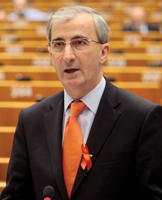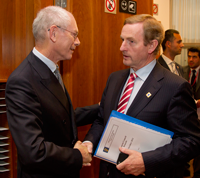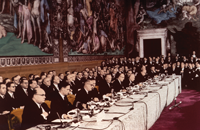European Diary
A euro zone banking union could be in place by 2014, under plans agreed by heads of state and heads of government at October’s European Council. The next summits, on 22-23 November and 13-14 December, are due to focus on finalising a deal for the supervision of all euro zone banks by the European Central Bank.
Speaking after the summit, Angela Merkel stated that there would be “no retroactive direct re-capitalisation” of Spanish banks, which appeared to rule out relief on Irish sovereign debt. Fine Gael MEP Seán Kelly, though, said that the question was not relevant to Ireland’s situation. “In the Irish case, our banks have already failed and have already been re-capitalised through the State,” he commented. “This was done to save the European banking system and cannot be undone but we can be compensated and have the debt burden relieved in recognition of the incredible price paid by the Irish people.”
Kenny and Merkel subsequently discussed the “unique circumstances” behind Ireland’s crisis and re-affirmed the Euro group’s commitment to examine the Irish financial sector “with a view to further improving the sustainability of the well-performing adjustment programme.”
Labour MEP Phil Prendergast credited François Hollande with persuading Merkel to act faster. She added: “Imposing more austerity on Ireland and other peripheral European countries costs us dearly in lost welfare and public services, while depressing the economy and destroying even more jobs.” Germany’s approach is increasingly dominated by the Bundestag elections, due to take place in September or October 2013.
The European Union’s contribution to peace and reconciliation, democracy and human rights in the continent over last 55 years will be formally recognised on 10 December when it receives the Nobel Peace Prize. The award is to be presented to Commission President José Manuel Barroso, Council President Herman Van Rompuy and Parliament President Martin Schulz at a ceremony in Oslo and the $1.2 million prize money is expected to go to charity.
“The EU is currently undergoing grave economic difficulties and considerable social unrest,” the awarding committee conceded but it “wishes to focus on what it sees as the EU’s most important result: the successful struggle for peace and reconciliation and for democracy and human rights.”
Fine Gael MEP Gay Mitchell praised the announcement: “We cannot ever forget the true reality and horror of war. Peace and solidarity is the only way forward and for that, the answer is more Europe.”
However, Martin Callanan, who leads the British Conservative MEPs, dismissed the award as “out of touch” as EU policies had led to social unrest in Greece and Spain. “The Nobel Peace Prize was devalued when it was given to newly-elected Barack Obama,” Callanan reflected. “By giving the prize to the EU, the Nobel committee has undermined the excellent work of the other deserving winners of this prize.”
 Radical reform of diplomacy ‘needed’
Radical reform of diplomacy ‘needed’
The communications revolution reduces the need for Irish ambassadors in every EU member state, Gay Mitchell has stated. “Many of these embassies could be managed from Dublin or from adjoining countries,” he commented. “For example, there could be one ambassador to the Benelux countries.”
Mitchell explained: “With 24-hour news and immediate communication between continents, that part of the old role of ambassadors of information or intelligence gathering is no longer central. Of course, Ireland needs face-to-face contact with friendly countries but most countries could be persuaded that it is not necessary to have a costly, fixed embassy to do so.”
Reducing the number of ambassadors would free up staff for the Department of Foreign Affairs and Trade’s trade brief, especially in Asia, Africa and the Pacific. Re-opening the embassy to the Holy See would be an opportunity to “co-operate with one of the best networked institutions in the world, especially in the developing world where Ireland has special interests and [where] the future lies.”
A European ‘social union’ with common EU standards on gender equality, social services and minimum wages is an “absolute necessity” for the survival of economic and monetary union, according to Emer Costello.
The Dublin MEP sits on the European Parliament’s Social Affairs Committee, which is bringing a report on the subject to the Parliament’s next plenary session (19-22 November). Costello wants to see a ‘social progress pact’ alongside the Stability and Growth Pact and a ‘social protocol’ on EU treaties.
“A growing social chasm is threatening Europe, and its core values of solidarity and cohesion,” she warned. “25 million people, 11 per cent of the workforce, are unemployed and 115 million people, almost one quarter of the total population, are at risk of poverty or social exclusion.” Costello’s husband is Trade Minister Joe Costello and the proposal has also been taken up by the union’s social democratic ministers.
Fianna Fáil MEP Liam Aylward has welcomed a promise by major European retailers to reduce food waste along the supply chain after he pressed for action in the European Parliament earlier this year.
“I strongly commend the European Retail Round Table for building on the work of the European Parliament in a meaningful way in terms of tackling food waste,” the Agriculture and Rural Development Committee negotiator stated. “At present, the EU produces 90 million tonnes of food waste each year and Irish consumers alone throw out 30 per cent of food bought in supermarkets, at a cost to each household of €1,000 each year.”
Retailers will run publicity campaigns to inform consumers that half of healthy and edible food is lost each year. “There are over 850 million people in the developing world currently suffering from chronic undernourishment,” he pointed out. “Food waste at the level we are currently tolerating is unacceptable and immoral.”









